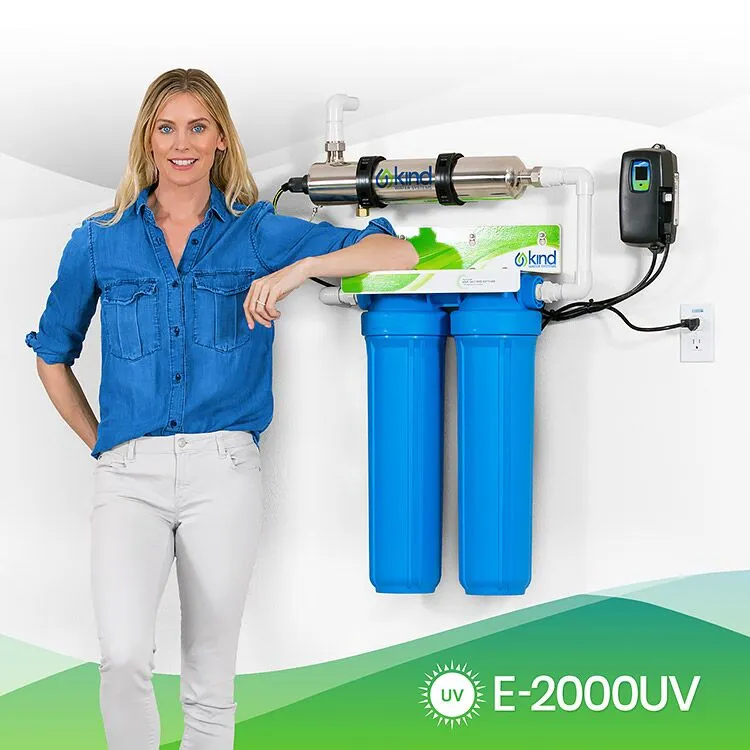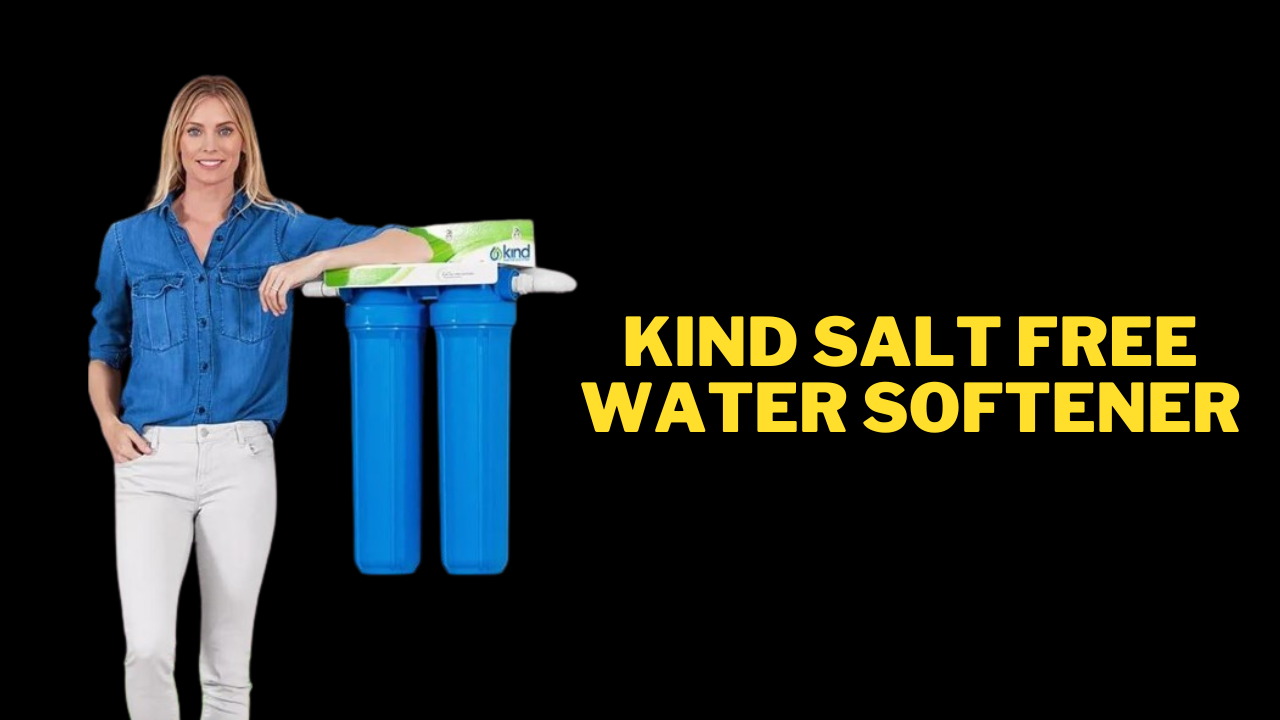The apparent issues produced by hard water in your house include limescale buildup on appliances and dishes as well as dry and dull skin and hair. The method to conveniently and affordably soften your entire home’s water is less apparent. You may have done your homework and know that a water softener is the way to go when dealing with hard water, but you may have also come across some conflicting advice on whether this type of softener is better for your home: one that doesn’t use salt.
This is why we’ve laid out the Kind Salt Free Water Softener Systems’ review as well as the benefits and drawbacks of purchasing it.

Kind Salt Free Water Softener
| Flow rate | Up to 15GPM |
| Capacity | 6 bathrooms |
| Pressure | 25-120psi |
| Operating temperature | 36-120 Degrees Celsius |
| Warranty | Lifetime |
| Installation | DIY |
Descaling is a technique that this salt-free water softener uses to change the chemical structure of water minerals. This changes the way particles can deposit in pipes and other water-using fixtures.
Traditional water softeners, on the other hand, employ salt to ionic exchange away hard water-causing minerals like magnesium and calcium and replace them with softer minerals like sodium and potassium.
How does this saltless water softener work?
The method by which Kind E-2000 salt-free water softener media naturally prevents the buildup of limescale involves the flow of water. The method converts the ions in hard water, which include magnesium and calcium, into tiny nanocrystals. This prevents the particles from “sticking” or causing scale as the water flows through by suspending them.
Template Assisted Crystallization (TAC) is a physical process that a catalyst medium uses to treat the water. The minerals transform into a hard crystal that is non-adherent. These devices just condition the water, not “soften” it. Additionally, a cleaning cycle is unnecessary to remove trapped components in these systems as they do not catch any materials.
This method has stood the test of time and protects against hard water scaling without softening the water.
Features
Saltless scale removal
Limescale, the powdery material seen in dried hard water areas, and other chemicals can be reduced with this saltless system, just as they do with traditional water softeners that contain salt.
Media Consumption
Replacement of the TAC media in E-2000 salt-free water softener is required no more than every three to five years. In addition, this whole-house water conditioning system may function with very little media. You may skip filling salt-free tanks with media, unlike other water softeners.
Saves water by reducing leakages
Also, unlike traditional water softeners, saltless water softener systems do not release any excess water into the water supply.
Maintenance and longevity
Less maintenance is required of them, and they are also not expensive to run. Plus, these systems often don’t require as much maintenance and are simpler, so they should last at least ten years, if not longer just like the old-fashioned ones.
Installation
Installing a Kind E-2000 Water System is the simplest option. A unique one-channel design is a hallmark of this system. Because of this, the only places for connections are the inlet and the outlet. The entire system is impenetrable. The system is designed to stand regardless of who installs it, so you don’t need a plumber.
Package contents
- Filter housing
- Sediment filter
- Cartridge
- Mounting hardware
- Spanner wrench
- O-rings with lube
- ¾” reducers
Pros and Cons
Pros
- Low maintenance
- No electricity consumption
- Lasts a long time
- Easy to install
Cons
- Slow operation
Should You Get a Kind E-2000 Whole-House Salt-Free Water Softener?
You may get a lot of bang for your buck (literally) with salt-free water softeners when it comes to eliminating water pollutants. Compared to traditional water softeners, they are easier to maintain as well.
A potential drawback of saltless water conditioners is that they might not always work as well as regular water softeners. Therefore, traditional systems may last longer in your home’s plumbing and appliances than saltless systems. Simply said, finding the optimal solution for your needs will probably necessitate some independent research on your part.
Applications of salt-free water softener
Preventing the scale build-up
The capacity of TAC water conditioners to remove existing pipe scales is another attractive feature. The scale-like effect of the micro-crystals generated by the TAC medium is similar to that of a snowball. In their journey through your pipes, the crystals will rip apart any scale that may be there and scrape it off.
A whole-house salt-free water conditioning system has the potential to remove scale buildup that has been present in your pipes for years. But if it discharges an excessive amount of scale, it might potentially clog downstream and completely stop your plumbing. The pipes in your house will probably be cleaner than anyone’s ever seen after that piece of plumbing is redone.
Tankless water heater
Your tankless water heater’s efficiency will drop and it will break down sooner if scale builds up in it. Extremely high energy bills are a direct result of scale-ridden water heaters, and the expense to descale them is prohibitive. The heating element in water heaters is a common target for scale buildup. Consequently, to heat the water, the temperature of the heater must first rise to the point where all the scale has been heated. Phosphate filters and other anti-scale filters don’t work well with really hot water.
A certain amount of scale might occur because the water’s warmth breaks down the phosphate. You may avoid the expensive expense of water heater salvage by using a salt-free softener for water to stop your tankless water heater from building up the scale.
Regions that have outlawed the use of salt-based water softeners
You can get around the prohibition on water softeners in hard water counties like several parts of California, including Santa Clarita and northern Los Angeles. Water softeners are illegal because of their high salinity, softener effluent is notoriously difficult to desalinate and reuse. Wastewater from softeners is a contentious topic in places like California, where there is a severe drought, and water conservation is of the utmost importance.
The next challenging step is for the municipal water treatment facilities to filter out the huge amounts of dissolved salt before redistributing the water to the rest of the city.
Advantages of using Salt-free water softeners
Preventing slimy feeling on the skin
One reason you won’t feel slippery while using salt-free softeners is that their mechanism of action is different from that of salt-based softeners. A filter changes the minerals into crystals in a salt-free process when water flows through it. That is why, unlike hard water scales, they won’t cling to your hair, skin, pipes, or windows. However, by eliminating the minerals and adding a slippery texture, the salt-based method transforms hard water into soft water.
Prevents minerals and scale buildup
When water leaves mineral buildup in pipes, the likelihood of blockages in big appliances increases. If you use the incorrect kind of salt in a salt-based softener, the system might become clogged with minerals. Also, clogs caused by big particles that don’t dissolve in water can necessitate a service call to remove them.
A salt-free water softener from Kind is better for the environment since it doesn’t generate brine, which can contaminate groundwater supplies and other problems that salt can cause.
Can Function Without Power
Traditional softeners add to energy costs, even though they don’t need a lot of power to operate. Furthermore, as is the case with every electrical item, they turn off when the power goes off. Some homeowners may not want to deal with the hassle of having to go through a series of processes to get them back online after a shutdown. There is no need for power with this premium system.
Frequently Asked Questions
Can I safely use softened water daily?
You may safely consume it. Softened water has a bit more sodium as the softener replaces the magnesium and calcium that make the water “hard” with sodium. Since it’s lower than what most people get from their daily diets, it shouldn’t be a problem.
How can a water softener that does not use salt benefit the user?
In addition to not requiring salt, another benefit of a salt-free water softener is that it does not produce any effluent, uses no power, and does not require chemicals. The possible drawback of salt-free systems is that they do not reduce hardness, thus some problems, such as scale formation, may persist.
Am I able to keep my Kind E-2000 setup even if I relocate?
It is really simple to uninstall this system and reinstall it in your new house. This salt-free system is comprehensive. A lot of homeowners have mentioned how easy it is.
What is the warranty of Kind E-2000?
You have 120 days from the date of purchase to request a refund if you are not completely satisfied with your system, and it also includes a limited lifetime warranty.
Final Words
Mineral backlog and hard water scale are more troublesome than they seem. Over time, particles gather in any water-handling device, whether it’s a big or little pipe, tap, or faucet. Over time, the accumulation of minerals causes the system to malfunction, which might manifest as a faucet that only gives a weak stream or a shower head that doesn’t rinse well enough. Repairing a water heater or dishwasher may also be an expensive and inconvenient ordeal that happens at the worst possible moment. Avoid wasteful repair costs with a salt-free water softener.
I hope now you have enough information about Kind Salt Free Water Softener to purchase.
